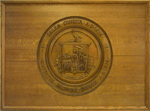French Canadians in Salem: Difference between revisions
No edit summary |
No edit summary |
||
| Line 1: | Line 1: | ||
The influx of French-Canadians in Salem began on a large scale during the 1860's. Most of these immigrants were farmers, many from Quebec, came with minimal education. They gravitated to employment at Naumkeag Mills. The brick tenements that they lived in nearby were called the "Pointe" district, now just the Point. | The influx of French-Canadians in Salem began on a large scale during the 1860's. Most of these immigrants were farmers, many from Quebec, came with minimal education. They gravitated to employment at Naumkeag Mills. The brick tenements that they lived in nearby were called the "Pointe" district, now just the Point in the lower Lafayette Street area. | ||
The records at St. | The records at St. Joseph's Parish indicate 90 families in membership in 1873. By 1889, the congregation numbered some 5,000 persons. By 1931, 1,795 families belonged to the Parish. | ||
Many in the French community spoke French at home, children attended French-speaking Catholic school, French-Canadians immigrants worked together at the textile mills, or leather tanneries, and bought supplies from French-speaking merchants. | Many in the French community spoke French at home, children attended French-speaking Catholic school, French-Canadians immigrants worked together at the textile mills, or leather tanneries, and bought supplies from French-speaking merchants. | ||
Revision as of 08:38, 21 June 2012
The influx of French-Canadians in Salem began on a large scale during the 1860's. Most of these immigrants were farmers, many from Quebec, came with minimal education. They gravitated to employment at Naumkeag Mills. The brick tenements that they lived in nearby were called the "Pointe" district, now just the Point in the lower Lafayette Street area.
The records at St. Joseph's Parish indicate 90 families in membership in 1873. By 1889, the congregation numbered some 5,000 persons. By 1931, 1,795 families belonged to the Parish.
Many in the French community spoke French at home, children attended French-speaking Catholic school, French-Canadians immigrants worked together at the textile mills, or leather tanneries, and bought supplies from French-speaking merchants.
An analysis of birth records for 1908-1910 for Salem indicated that about 1/3 of the inhabitants were old Yankee or assimilated Irish, another 1/3 were French Canadians. A rough breakdown of the the remainder indicate 5% Polish, 9% Russian, 3% Italians.
For more on the French Canadians in Salem, see Sainte Anne Church, St. Joseph's Church, Franco-American Institute of Salem, Inc., Richelieu Club and Castle Hill on this wiki.
See Also
Vertical File in Salem Collection - Immigrants to Salem (Ethnic backgrounds and occupation trends)
History of French Canadians in Castle Hill Salem by Anthony V. Salvo
The Franco-Americans of New England: a history by A. Chartier
